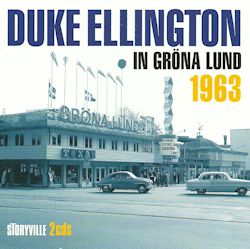CD1
1. Boo-dah
2. Laura
3. Main Stem
4. Take the “A” Train
5. Suite Thursday:
Misfit Blues/Schwiphti/Zweet Zursday/Lay-by
6. Deep Purple
7. Silk Lace
8. New Concerto for Cootie
9. Tootie for Cootie
10. The Star-Crossed Lovers
11. Things Ain’t What They Used to Be
CD2
1. Intermission Music by Duke Ellington
2. I Didn’t Know about You
3. All of Me
4. Jeep’s Blues
5. Rose of the Rio Grande
6. Black and Tan Fantasy
7. Kinda Dukish/Rockin’ in Rhythm
8. In a Sentimental Mood
9. Mr Gentle and Mr Cool
10. Lullaby of Birdland
11. Mood Indigo
12. Sophisticated Lady
13. I Let a Song Go out of My Heart/Don’t Get Around Much Any More
13. One More Once or One More Bossa Nova
14. One More Once or One More Twist
Cootie Williams, Eddie Preston, Rolf Ericson – Trumpet
Ray Nance – Trumpet, violin, vocals
Lawrence Brown, Chuck Connors, Buster Cooper – Trombone
Jimmy Hamilton – Tenor sax, clarinet
Russell Procope – Alto sax, clarinet
Johnny Hodges – Alto sax
Paul Gonsalves – Tenor sax
Harry Carney – Baritone sax, clarinet, bass clarinet
Duke Ellington – Piano
Ernie Shepard – Bass
Sam Woodyard - Drums
The release of several previously unissued recordings has given us a better idea of what it was like for the Duke Ellington Orchestra to spend much of its
time touring. It must have been tiring for the musicians and particularly for Ellington himself, who not only had to keep a load of fairly wilful musicians
together but also to continually write new pieces for them to play. Duke and his team must have been glad when they played more than a one-night stand in a
single venue.
In June 1963, the band spent six nights performing at the Gröna Lund in Stockholm, where they played on the outdoor stage for half an hour each night
before moving indoors to the venue’s Dance Inn to play two more sets for dancing (lasting almost two hours, 20 minutes). Two of these sets were recorded,
and are released on this double CD for the first time.
The recording quality is variable, with wavering clarity and occasional fuzziness. The first track begins without its opening, and you can even hear lots
of background chatter at the start of the second CD, where Duke improvises a piano solo while his musicians have a break. Despite the flaws in the sound,
the recording captures the feeling of a great band playing in a relaxed atmosphere.
While much of the repertoire consists of familiar Ducal tunes, the soloists frequently provide a new take on the material. For instance, Sweden’s own Rolf
Ericson supplies an interesting trumpet solo with hints of bebop in Lullaby of Birdland. And Harry Carney does an impeccable solo on Mood Indigo, substituting his bass clarinet for the trumpet that originally made part of the trio which introduces the tune. Cootie Williams’
return to the band is celebrated with the New Concerto for Cootie and Tootie for Cootie. In fact Williams had been absent from the band
for 22 years and he had only returned in 1962, but he settled in so well that it was as if he had never been away.
Cootie was not the only one who had returned after some years away: both Johnny Hodges and Lawrence Brown came back and this album shows how important they
were to the band. Hodges joins in after Duke’s Intermission Music to play I Didn’t Know about You, and he is also featured in his usualpièces de résistance: All of Me and Jeep’s Blues. Lawrence Brown follows with his own speciality, Rose of the Rio Grande.
As well as the old favourites, there are newer pieces such as Suite Thursday, which was premiered at the Monterey Jazz Festival in 1960, andSilk Lace from the more recent Afro-Bossa album. Jimmy Hamilton is spotlit in the latter, as well as in Billy Strayhorn’s arrangement of Deep Purple.
This is not an outstanding Duke Ellington album but, being by the Ellington Orchestra, it is still remarkable.
Tony Augarde
www.augardebooks.co.uk
